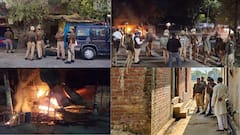He Would Lure Women With Dreams, Kill Them With Pills: ‘Cyanide’ Mohan And His 6 Years Of Crime
Mohan Kumar was a silent psychopath who lived a normal life like any other person. Inside him, existed a serial killer that was just unstoppable.

The mother shows her daughter a photograph of a man, and tells her what a good match he would be. As the daughter remains non-committal, the frustrated mother asks when will she get married, reminding her that she was only getting older. To this, an angry Anjli Bhati shows her mother some photographs of girls who died because they were all lured by a man on the pretext of marriage. Under continuous societal and family pressure, they had all trusted the one person in whom they found their ‘dream’ man, only to be killed by him.
Sonakshi Sinha essays the role of the police officer, Anjali Bhati, in the much talked about web series ‘Dahaad’. The story, which draws its inspiration from a similar set of events that once shook the country, talks in detail about things that never came into the limelight from the real-life case that made headlines across the country.
The Beginning Of The Beginning
In June 2009, Anitha Bangera of Barimaru, a village 40 km from Mangalore in the Dakshin Kannada district of Karnataka, left home with gold, money and an expensive cellphone gifted by her brother Madhav, according to police records. Her mother Kusuma was at work in the fields and others were away from home. The gold Anitha took with her was valued at around Rs 2.7 lakh then.
Her disappearance resulted in rumours that sparked violence and arson. When Anitha's parents lodged a complaint with the police, the latter said the 22-year-old had likely been lured by a Muslim man and had been converted to Islam.
Angered by the police inaction, villagers lay siege to the Bantwal police station, demanding the arrest of Anitha's 'kidnappers'. Fearing the right-wing mob, the police sought a few days' time and subsequently formed a high-level investigation team. It was led by the then-circle inspector Nanjunde Gowda and then-assistant superintendent Chandragupta, according to a report in The Indian Express.
The police looked into call records of Anitha and found a number on which she would talk for long hours. The finding took the police to the residence of one Sridhar in Madikeri. What he told the police was the beginning of a point that was about to open numerous knots.
Sridhar said the SIM was in his name but the number was used by his sister, Kaveri, who had been missing. It was just the beginning of an investigation that would bring curtains down on a gory story.
ALSO READ | Stabbed '37 Times', Head Battered: Brutal Murder Of A 7-Year-Old That Saw Conviction After 3 Decades
Call Trails - A Long List Of 'Missing' Women
Kaveri Manku had been missing since March 17 the same year (2009). The next steps were the same as in Anitha's case. Kaveri's CDR records were checked, which led the officers to Pushpa Vasukoda in Kasaragod. She also missing too, for the last one year. Her call records took the probe to Vinuta Pijina of Puttur in Karnataka, another missing woman. A long list then emerged of women who were not related to each other but yet 'talked' for hours somehow.
The effort continued and so did the trail. What police thought initially was they were about to bust a gang involved in human trafficking as it led to 20 such women. The call was made from the phone of one missing woman to another.
Bodies Found But Not Identities
The dead body of a woman, frothing at the mouth, was found in a toilet at the inter-city bus stand in Hassan. The door of the toilet was locked from the inside. She was Anitha, found dead in a town 160 km away from her native place. This was just a day after she went missing but the police team probing her missing case days after the recovery of her body had no clue at all. She was dressed, what looked like, in wedding attire without any jewellery. Kaveri, whose number police traced from Anitha's phone, was found dead in a toilet in Mysore in the same month she disappeared, and in a town almost 200 km from her place.
The number of victims grew each year — one in 2004, three in 2005, four in 2006, three in 2007, two in 2008 and nine in 2009 — according to the IE report.
The recoveries might look like making a link but in reality they did not raise a bit of suspicion. There were more bodies and all of them were found in distant towns. So, whenever police published their photographs in newspapers, or put them in local mortuaries, police stations, they never reached their families. Without a claimant, the authorities would do the last rites.
The post-mortem revealed 'poison' as the cause of death and the files closed by mentioning them as 'unnatural' or 'suicide' cases. It was spread across at least 10 police station areas. As per a report by BangloreMirror, blood samples of only two victims were sent for forensic test and both showed traces of 'cyanide', but it still failed to push the probe for a deeper dive.
As per the BangloreMirror report, most of these 20 women were found dressed in wedding sarees with 'not a single piece of jewellery' on them.
ALSO READ | She 'Preyed' At Temples To Be Rich: Twisted Tale Of 'Cyanide' Mallika, India's 1st Woman Serial Killer
Trail Ends, Murky Details Come Out
The police that began the case as a normal 'missing' one, and thought of a possible human trafficking angle, now ruled out all. They knew it was bigger than that. The dump data from Kaveri's phone was analysed and all the CDRs showed a clever use of one victim's number to talk to another.
The police intensified their operation to dig out common IMEI numbers in use and found that all the numbers were, at some time, active in a village called Deralakatte in Mangaluru. Another theory of a possible prostitution racket was brewing by then.
A young boy namely, Dhanush, was the user. But he said that it was his uncle who gave him the phone. This uncle was a teacher at a school and was known by the name of Mohan Kumar.
According to the IE report, the police took the help of one Sumithra in Deralakatte to arrest Mohan. She informed the police that Mohan had approached her also saying he was a plantation supervisor and offered to marry her. Mohan fell into the trap, and the police arrested one of the most ruthless serial killers in the country in October 2009.
The Startling Truth
Truth is always bitter, painful, and terrifying and yet, it eases the complexities. What Mohan simply told the police was not what they were used to. The mere fact that it was all one man's doing was enough to give goosebumps.
Mohan admitted to killing these women, and more — 32 to be precise, though the police could only identify only 20.
Mohan told the police that he would spend his days at the bus stands to find his victims. He would break conversations with girls taking clues if any of them took an interest in him. The conversation would convert into meetings and meetings into marriage proposals.
Mohan would ask the girls to flee from their homes citing various reasons of family, caste and more. The couple would go to a hotel or a lodge. Kumar promised them to get married the very next day. During the night, he would make physical relations with the girls. While en route to temples or their wedding locations, he would stop by bus stops and persuade the girls to take a contraceptive pill, which would be laced with cyanide, on the pretext of avoiding any unwanted pregnancy. He would tell them to close the doors from inside because they might feel sick.
Interestingly, Mohan had the fertility cycle of his victims mapped and always made sure to execute his plan when his victims were ovulating. After sending the women to public toilets with cyanide-laced morning-after pills, he would calmly go back to the lodge or hotel where they put up, take the money, jewellery and flee.
Everything started to connect — the long six years, 20 identified victims, one serial killer and his infallible plan.
Caste, Dowry, Poverty And Marriage
In Dahaad, it was shown that every time Anjali Bhati came in front of a constable he would light some incense sticks to 'purify' the area. It didn't matter that she was his senior, what mattered was that she was from a 'lower caste' than his. The scene is repeated several times, and hits hard on each occasion. 'Dahaad' lay bare a bitter truth of caste, religion, gender and everything wrong in a society.
Who were these women who Mohan picked and killed? Why would so many women fall to Mohan without any doubt? Why no one of them ever talked about this to their families? Why did the murders remain invisible for six years? All answers lead to the same reasoning.
Mohan used different names and identities for each of the victims. What was common in all was that he had a government job and was ready to marry them without any dowry.
According to the Indian Express report, Mohan introduced himself as Sudhakar Kulal to Anitha, he was Shashidhar Poojary to Sunanda, and Sudhakar Acharya to Kaveri. It was not just the name that he changed. He would always tell the women that he belonged to their caste.
All the victims belonged to lower-caste families. All were poor. Some of them rolled bidis for a living, some were from labourers' families. All were battling the pressure of marriage because either no one agreed to marry them as their communities stood lower to others, or if anybody did dowry would shatter the arrangement.
Here, Mohan made his entry. A man of their caste with a stable government job who was not asking any dowry. What he sought was time to tell their families. At times, Kumar would call the girls' families and tell them they are happily married and would soon meet them. The day never came.
A post-arrest search of his place got police some incriminating evidence — jewellery in plastic bags, letterheads and cards with different names he used to meet the girls, media reports said.
From Mohan To 'Cyanide Mohan'
News about the cases spread like fire and people started referring to Mohan as 'Cyanide Mohan'. But just who was he, and how did he become 'Cyanide Mohan'?
Mohan was a teacher at a school in rural Mangaluru. He was once charged with 'attempt to murder' when a woman claimed that he pushed her into the Netravathi river. However, he maintained that it was a false claim as the woman wanted to marry him and he refused as he was already married. The woman was saved by local fishermen.
Kumar was sent to jail for a month and, as per BangloreMirror, he met a goldsmith there. The latter told him about cyanide and how it is used to clean jewellery. According to the report, Mohan would pose as a goldsmith to buy cyanide and mix it with contraceptive pills to execute his plans.
Mohan had married thrice. He divorced his first wife Mary saying she wanted to convert him to Christianity, some media reports suggest. He then married Manjula and had two sons with her.
Unknown to Manjula, Kumar married Sri Devi and had a son and daughter with her. While Manjula lived in Mangaluru, Devi was in Deralakatte. Both were unaware of each other's existence. Kumar would manage time with both families.
After the incident that landed him in jail in 2003, Kumar lost his job but he did not tell this to any of the wives. He maintained his normal routine. This is when he spent time at bus stops, and roadside areas and devised the plan. When it worked once, Kumar became unstoppable.
ALSO READ | How America's Deadliest Serial Killer, Who Confessed To Over 90 Murders, Hoodwinked Law For Years
Trial And Sentence - How Mohan Fought The Case
Mohan fought his case by himself. With utter calmness, he would go through the chargesheet and question the police and witnesses, according to reports.
He was awarded the death sentence in five cases, and life imprisonment in three. In 2020, he was convicted for the last of his 20 murder cases. The victim was a Kerala woman whom he killed in 2006. Though he claimed to have murdered 32, the police could verify only 20 and charged him separately in each case.
The prime witness against him was a woman who had survived the bid on his life as she had only licked the cyanide-laced pill and became unconscious. Kumar is said to be lodged in Hindalga Central jail in Belagavi, Karnataka, at present.
Bright Student, Teacher And A Silent 'Psychopath'
Mohan Kumar was born on April 6, 1963, in a remote village in Karnataka. His family belonged to a Scheduled Caste. His parents were labourers and worked on farmlands owned by wealthy landowners in the area. Mohan had two brothers and a sister, and all of them were smart and did fairly well in school, according to media reports.
Kumar started his career as a teacher in November 1984, at Shiradi Primary School, and subsequently worked in other school districts.
From a bright student to a teacher and then to a silent psychopath, Mohan's transition is difficult to understand.
Those who watched Dahaad would know how the character, played by Vijay Varma, was an angel to the distraught women who were considered pain and burden in their own families. He was a liberator for them. And liberate he did, from the shackles of a life that was not fair to them.






































